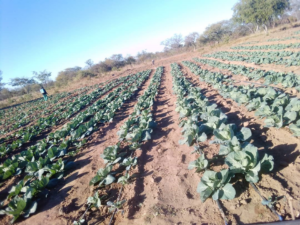
‘I am grateful for the support ,l received through the Accelerator Project (Hand in Hand Zimbabwe Initiative) ,today am a proud entrepreneur in my community. I am confident and empowered’-Tariro Takawira.
Tariro Takawira, a 33-year-old woman from Mhou Village in ward 15 Chirumanzu, faced difficult times in 2020 and struggled to provide basic needs for her family nor a decent meal per day.
In 2020, she joined Hand in Hand Zimbabwe’s supported self-help group, Life Forward Star Club under the MEY (Motivated & Entrepreneural Youth) project. After the Star Club had received the six modular business development trainings, Tariro was inspired to start a horticulture garden. She borrowed money to start the horticultural garden from the Star Club’s Internal Saving and Lending (ISALs) scheme.
Then, through her horticultural business, Tariro’s average net income ranged from USD 40 to USD 80 per month, depending on the season, income that was not enough to sustain operations and fend for the family. She could not afford to pay for her children ‘s school fees and provide food for them. The business nearly collapsed.
However, in July 2023, Tariro received a loan from Hand in Hand Zimbabwe’s Accelerator Project, which enabled her to expand and diversify her business portfolio by starting poultry, popcorn production, mushroom cultivation and a thatch grass enterprise. The diversification of her enterprises not only broadened Tariro’s revenue streams but also allowed her to tap into different market segments and capitalize on various opportunities.

In an effort to tap on her broadened value chains, become competitive and formalize her operations, Tariro registered her BelDondo Gardens Enterprise as a Private Business Corporation (PBC). Tariro Takawira’s journey from a modest income earner to a thriving entrepreneur showcases the transformative power of entrepreneurship programs and access to financial resources. Through dedication, hard work, and strategic decision-making, she was able to expand her business portfolio and improve her livelihood significantly.
Tariro’s success in improving her agricultural yields can be attributed to her adoption of advanced agronomic practices. By implementing a clear production plan, Tariro was able to optimize her crop rotation strategy, incorporating a variety of plant families such as brassica, root crops, cucurbits, and solanaceae. This diversified approach not only helps in maximizing yields but also contributes to soil health and fertility management.

Tariro now employs two full time staff to support with work in the enterprises showing her commitment to creating job opportunities within her community. By providing employment, she not only supports the livelihoods of those individuals but also contributes to the overall economic growth of the area. As her business grows Tariro will continue to create additional employment opportunities and contribute to the local economy.
Tariro adapted to sustainable climate agriculture practices techniques such as drip irrigation and irrigation scheduling, improved water management, fertility trenches, rain pipes, and mulching. These practices not only ensure efficient water usage but also help in maintaining soil moisture levels and reducing erosion risks on her garden
Ms. Takawira ‘s empowerment and the support of her business by the community are significant developments that have positive impacts on both her personal life and the local community. The empowerment of women, particularly in developing regions, is a crucial aspect of societal progress and economic development. When women are empowered to become entrepreneurs and contribute to their families’ well-being, it not only improves their own lives but also has a ripple effect on the community as a whole. The positive effects of
Tariro’s empowerment and the support for her business extend beyond her individual circumstances. The community benefits from having access to goods or services locally, which reduces the need for long commutes to larger towns. This not only saves time but also contributes to the local economy by keeping spending within the community.
BelDondo has demonstrated significant enterprise growth in poultry business. She started by raising 50 birds per batch, and through strategic planning and expansion efforts, she has increased the batch size to 200 birds. Her vision is to further scale up to 500 birds per batch with a three-week interval.
Tariro ‘s business portfolio value net profit per month is USD 950 .
To support her ambitious growth plans, BelDondo invested in expanding her poultry infrastructure with a 1000 capacity fowl run, indicating her commitment to scaling up operations.
Hand in Hand Zimbabwe’s accelerator project aims to provide financial support and business training to entrepreneurs in Zimbabwe. The project focuses on empowering individuals to start or expand their businesses, thereby contributing to economic growth and poverty reduction in the country. Tariro’s experience with the accelerator project demonstrates its impact on local entrepreneurs and the potential for economic development through small business investment.

